

Commentary Select
Commentary Select




Ancient Christian Texts - Commentaries on Job, Hosea, Joel, and Amos (ACT)
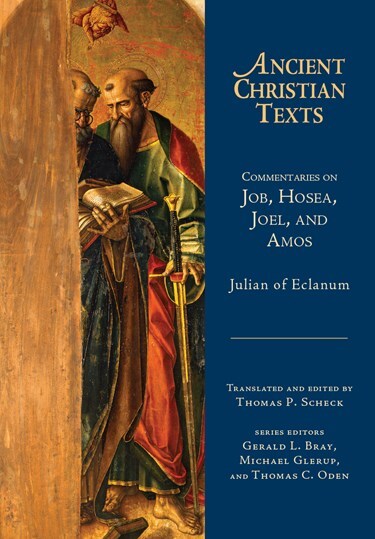
Ancient Christian Texts - Commentaries on Job, Hosea, Joel, and Amos (ACT)
"Then the Lord answered Job out of the whirlwind..."
Julian of Eclanum (c. 386–455) was the bishop of Eclanum, located in modern-day Italy. In this volume in IVP's Ancient Christian Texts series, Thomas Scheck provides a new translation of Julian's commentaries on the biblical books of Job and those of three Minor Prophets: Hosea, Joel, and Amos. Here, readers will gain insight into how early Christians read texts such as God's speech to Job, Hosea's symbolic representation of God's unending love for a faithless Israel, Joel's anticipation of the outpouring of the Holy Spirit, and Amos's call for social justice.
While Julian was a well-known leader among the Pelagians, whose theology was famously opposed by Augustine of Hippo and ultimately determined to be outside the bounds of the church's orthodoxy, the Pelagian movement was a significant element within the early church. And although Julian's Pelagianism does not fundamentally affect the commentaries presented in this volume, Christians can gain insight into the truths of Scripture by reading the text alongside others, even when—or perhaps especially when—we might disagree with other aspects of their beliefs.
Ancient Christian Texts are new English translations of full-length commentaries or sermon series from ancient Christian authors that allow you to study key writings of the early church fathers in a fresh way.
Thomas P. Scheck (PhD, University of Iowa) is associate professor of theology at Ave Maria University in Ave Maria, Florida. He is the author of Origen and the History of Justification and Erasmus's Life of Origen. He is also the editor of two volumes of Jerome's Commentaries on the Twelve Prophets and the translator for Origen's Homilies on Numbers in IVP's Ancient Christian Texts series, as well as the translator of Origen: Commentary on the Epistle to the Romans and St. Jerome: Commentary on Matthew in the Fathers of the Church series and Jerome's Commentaries on Isaiah and Ezekiel in the Ancient Christian Writers series.
Ancient Christian Texts - Commentaries on Romans and 1-2 Corinthians

Ancient Christian Texts - Commentaries on Romans and 1-2 Corinthians
Ambrosiaster ("Star of Ambrose") is the name given to the anonymous author of the earliest complete Latin commentary on the thirteen epistles of Paul. The commentaries were thought to have been written by Ambrose throughout the Middle Ages, but their authorship was challenged by Erasmus, whose arguments have proved decisive.
Here for the first time Ambrosiaster's commentaries on Romans and the Corinthian correspondence are made available in English translation, ably translated and edited by Gerald L. Bray.
The commentaries, which serve as important witnesses to pre-Vulgate Latin versions of Paul's epistles, are noteworthy in other respects as well. Ambrosiaster was a careful and thoughtful interpreter, with little use for allegory, though he employed typology judiciously. Writing during the pontificate of Damasus (366-384), he is a witness to Nicene orthodoxy and frequently comments on themes related to the Trinity, the consubstantiality of the Son, the problem of the unbelief of the Jews and the nature of human sinfulness. He had a keen eye for moral issues and often offers comments that reflect his knowledge of how the church had changed from the time of the apostles to his own day.
This commentary offers a rich repository of insight into the thinking of pre-Reformation church leaders for the leaders and teachers of the church today.
Ancient Christian Texts - Commentaries on Romans, 1-2 Corinthians, and Hebrews (ACT)
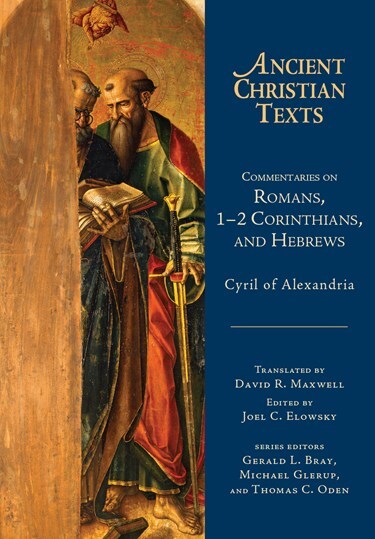
Ancient Christian Texts - Commentaries on Romans, 1-2 Corinthians, and Hebrews (ACT)
"But in fact Christ has been raised from the dead..."
Cyril of Alexandria (c. 378–444) was one of the most significant figures in the early church: bishop of the church, defender of orthodoxy, proponent of Alexandrian theology. Indeed, he is probably best known as the supporter of the term Theotokos (God-bearer) with regard to Mary in opposition to Nestorius during the early Christological controversies.
But Cyril viewed himself, first and foremost, as an interpreter of Scripture. In this volume in IVP Academic's Ancient Christian Texts series, Joel Elowsky and David Maxwell offer—for the first time in English—a translation of the surviving Greek and Syriac fragments of Cyril's commentaries on four New Testament epistles: Romans, 1–2 Corinthians, and Hebrews.
Abounding with Cyril's insights regarding these canonical texts and biblical themes such as the triune nature of God, Christ's sacrificial death, and justification, these commentaries are essential tools for understanding Cyril's reading of Holy Scripture.
Ancient Christian Texts is a series of new translations, most of which are here presented in English for the first time. The series provides contemporary readers with the resources they need to study for themselves the key writings of the early church. The texts represented in the series are full-length commentaries or sermon series based on biblical books or extended scriptural passages.
Ancient Christian Texts are new English translations of full-length commentaries or sermon series from ancient Christian authors that allow you to study key writings of the early church fathers in a fresh way.
Joel C. Elowsky (PhD, Drew University) is professor of historical theology at Concordia Seminary, St. Louis where he also serves as the director of the Center for the Study of Early Christian Texts. He is the editor of various texts including two volumes on John's Gospel and We Believe in the Holy Spirit in the Ancient Christian Commentary on Scripture series, and of volumes on Cyril of Alexandria, Theodore of Mopsuestia, and Eusebius of Caesarea.
Ancient Christian Texts - Commentaries on the Twelve Prophets

Ancient Christian Texts - Commentaries on the Twelve Prophets
Jerome (c. 347-419/20), one of the West's four doctors of the church, was recognized early on as one of the church's foremost translators, commentators and advocates of Christian asceticism. Skilled in Hebrew and Greek in addition to his native Latin, he was thoroughly familiar with Jewish traditions and brought them to bear on his understanding of the Old Testament. Beginning in 379, Jerome used his considerable linguistic skills to translate Origen's commentaries and, eventually, to translate and comment on Scripture himself.
In 392, while preparing his Latin Vulgate translation of the Bible, Jerome wrote his commentary on Nahum, the first in a series of commentaries on five of the twelve minor prophets. Micah, Zephaniah, Haggai and Habakkuk soon followed. He was interrupted in 393 by the Origenist controversy, after which he became a vocal critic of Origen of Alexandria—a controversy he referred to in his commentaries on Jonah and Obadiah in 396.
This Ancient Christian Texts volume, edited and translated by Thomas Scheck in collaboration with classics students from Ave Maria University, includes these seven commentaries. The second volume contains Jerome's commentaries on Zechariah, Malachi, Hosea, Joel and Amos, all of which were written in 406, completing the group of twelve prophets.
Throughout these commentaries Jerome displays his familiarity with both Hebrew and Greek texts. His spiritual exegesis relies heavily on the exegetical work of Origen. Jerome looks beyond the nationalistic sentiments of the prophets to see a wider message about God's mercy and justice. His commitment to the truthfulness of the Scriptures as the Word of God is exemplified by his defense of the historicity of Jonah. He finds the fundamental message of the prophets to be the intent to console the saints, so that they may disdain the things of this world and prepare themselves for the day of judgment.
Ancient Christian Texts - Commentaries on the Twelve Prophets, Volume 2 (ACT)
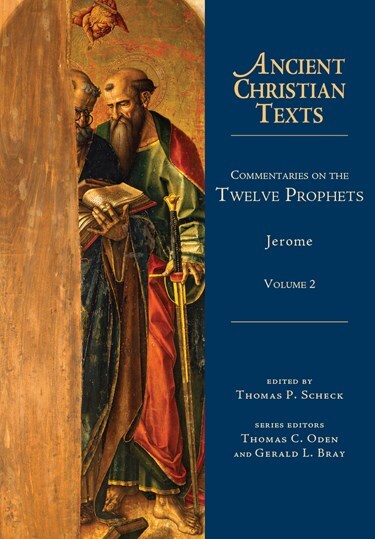
Ancient Christian Texts - Commentaries on the Twelve Prophets, Volume 2 (ACT)
Jerome (c. 347-419/20), one of the West's four doctors of the church, was recognized early on as one of the church's foremost translators, commentators, and advocates of Christian asceticism. Skilled in Hebrew and Greek in addition to his native Latin, he was thoroughly familiar with Jewish traditions and brought this expertise to bear on his understanding of the Old Testament. Beginning in 379, Jerome used his considerable linguistic skills to translate Origen's commentaries and, eventually, to translate and comment on Scripture himself.
Jerome began writing commentaries on the twelve minor prophets in 392 while preparing his Latin Vulgate translation of the Bible. After completing Nahum, Micah, Zephaniah, Haggai, and Habakkuk, he was interrupted in 393 by the Origenist controversy, after which he became a vocal critic of Origen of Alexandria. He finished his commentaries on Jonah and Obadiah in 396. These seven commentaries are available in the ACT volume Commentaries on the Twelve Prophets, Volume 1.
The Origenist controversy and his commentary on Matthew occupied Jerome's time for the next several years. He finally completed his commentaries on the rest of the twelve prophets in 406. This volume, edited by Thomas Scheck, includes those final five commentaries on Zechariah, Malachi, Hosea, Joel, and Amos.
Throughout these commentaries, Jerome refers frequently to the work of previous commentators, and his spiritual exegesis relies heavily on the exegetical work of Origen - though he acknowledges that "I have not followed them in everything." Jerome hears in these texts God's judgment and mercy not only on Israel but especially on the Christian community. In Amos, for example, he says that "whatever we have said about Judah refers to the church." He wrestles especially with the scandalous message of Hosea, which he refers to as drowning with Pharaoh during the crossing of the Red Sea. But he trusts that "the ways of the Lord are the reading of the Old and New Testament, the understanding of the holy Scriptures."
By sharing the wisdom he received from these biblical texts, Jerome's magisterial commentaries help us walk more faithfully in God's ways.
Ancient Christian Texts are new English translations of full-length commentaries or sermon series from ancient Christian authors that allow you to study key writings of the early church fathers in a fresh way.
Thomas P. Scheck (PhD, University of Iowa) is associate professor of theology at Ave Maria University in Ave Maria, Florida. He is the author of Origen and the History of Justification and Erasmus's Life of Origen. He is also the editor of two volumes of Jerome's Commentaries on the Twelve Prophets and the translator for Origen's Homilies on Numbers in IVP's Ancient Christian Texts series, as well as the translator of Origen: Commentary on the Epistle to the Romans and St. Jerome: Commentary on Matthew in the Fathers of the Church series and Jerome's Commentaries on Isaiah and Ezekiel in the Ancient Christian Writers series.
Ancient Christian Texts - Commentary on Isaiah

Ancient Christian Texts - Commentary on Isaiah
Eusebius of Caesarea (ca. 260--ca. 340), one of the early church’s great polymaths, produced significant works as a historian (Ecclesiastical History), geographer (Onomasticon), philologist, exegete (commentaries on the Psalms and Isaiah), apologist (Preparation for and Demonstration of the Gospel) and theologian. His Commentary on Isaiah is one of his major exegetical works and the earliest extant Christian commentary on the great prophet. Geographically situated between Alexandria and Antioch, Eusebius approached the text giving notable attention to historical detail and possible allegorical interpretation. But above all, employing the anologia fidei, he drew his readers’ attention to other passages of Scripture that share a common vocabulary and theological themes, thus allowing Scripture to interpret Scripture.
Here, for the first time in English, Jonathan Armstrong provides readers with a highly serviceable translation of Eusebius’s notably difficult Greek text, along with a helpful introduction and notes.
Ancient Christian Texts - Commentary on Jeremiah

Ancient Christian Texts - Commentary on Jeremiah
Jerome (c. 347-419), one of the West's four doctors of the church, was recognized early on as one of the church's foremost translators, commentators and advocates of Christian asceticism. Skilled in Hebrew and Greek in addition to his native Latin, he was thoroughly familiar with Jewish traditions and brought them to bear on his understanding of the Old Testament. In 405 Jerome completed his Latin translation of the Old Testament, based on the Hebrew text, and not long afterward began to work on commentaries devoted to the major prophets—Daniel (407), Isaiah (408-410), Ezekiel (410-414), culminating with Jeremiah but reaching only through chapter 32 before his death in 419.
Throughout the commentary Jerome displays his familiarity with both Hebrew and Greek texts of Jeremiah, often establishing the literal meaning through the Hebrew text and offering a spiritual interpretation that draws on the Septuagint. He frequently interacts with other translations known from Origen's Hexapla. Jerome's extensive education in the classics and Jewish tradition as well as in both Antiochene and Alexandrian exegesis shine through the commentary at every point. Here for the first time Michael Graves supplies readers with a highly readable translation in English, useful textual notes and a helpful introduction.
Ancient Christian Texts - Commentary on John Volume 1

Ancient Christian Texts - Commentary on John Volume 1
Cyril of Alexandria (ca. 378-444), one of the most brilliant representatives of the Alexandrian theological tradition, is best known for championing the term Theotokos (God-bearer) in opposition to Nestorius of Constantinople. Cyril's great Commentary on John, offered here in the Ancient Christian Text series in two volumes, predates the Nestorian controversy, however, and focuses its theological fire power against Arianism. The commentary, which is addressed to catechists, displays Cyril's breath-taking mastery of the full content of the Bible and his painstaking attention to detail as he seeks to offer practical teaching on the cosmic story of God's salvation.
David Maxwell provides readers with the first complete English translation of the text since the nineteenth century. It rests on Pusey's critical edition of the Greek text and puts on display Cyril's theological interpretation of Scripture and his appeal to the patristic tradition that preceded him. Today's readers will find the commentary an indispensable tool for understanding Cyril's approach to Scripture.
Ancient Christian Texts - Commentary on John Volume 2

Ancient Christian Texts - Commentary on John Volume 2
Cyril of Alexandria (ca. 378-444), one of the most brilliant representatives of the Alexandrian theological tradition, is best known for championing the term Theotokos (God-bearer) in opposition to Nestorius of Constantinople. Cyril's great Commentary on John, offered here in the Ancient Christian Text series in two volumes, predates the Nestorian controversy, however, and focuses its theological fire power against Arianism. The commentary, which is addressed to catechists, displays Cyril's breath-taking mastery of the full content of the Bible and his painstaking attention to detail as he seeks to offer practical teaching on the cosmic story of God's salvation.
David Maxwell provides readers with the first complete English translation of the text since the nineteenth century. It rests on Pusey's critical edition of the Greek text and puts on display Cyril's theological interpretation of Scripture and his appeal to the patristic tradition that preceded him. Today's readers will find the commentary an indispensable tool for understanding Cyril's approach to Scripture.
Ancient Christian Texts - Commentary on the Gospel of John

Ancient Christian Texts - Commentary on the Gospel of John
Theodore of Mopsuestia, born in Antioch (c. 350) and a disciple of Diodore of Tarsus, serves as one of the most important exemplars of Antiochene exegesis of his generation. Committed to literal, linguistic, grammatical and historical interpretation, he eschewed allegorical explanations that could not be supported from the text, though he was not averse to typological interpretations of Old Testament texts that were supported by the New.
Regrettably, Theodore was dragged posthumously into the Nestorian controversy, and his works were condemned by the Three Chapters and the Council of Constantinople in 553. As a result many of his theological and exegetical works were lost or destroyed. The original Greek version of his Commentary on the Gospel of John remains only in fragments. This new English translation is based on an early complete Syriac translation dated A.D. 460-465, within forty years of Theodore’s death in 428.
While charges of heterodoxy against Theodore may not be entirely justified, there remains an apparent dualism in his Christology that should be critically viewed in light of the later Chalcedonian formula. With this caution, there still remains much that is valuable for contemporary readers, whether preachers, students or lay people interested in the early church’s understanding of the Gospel of John.
Here for the first time is a complete English translation of this valuable work, ably translated by Marco Conti and edited by Joel C. Elowsky.
Ancient Christian Texts is a series of new translations, most of which are here presented in English for the first time. The series provides contemporary readers with the resources they need to study for themselves the key writings of the early church. The texts represented in the series are full-length commentaries or sermon series based on biblical books or extended scriptural passages.
Ancient Christian Texts - Greek Commentaries on Revelation
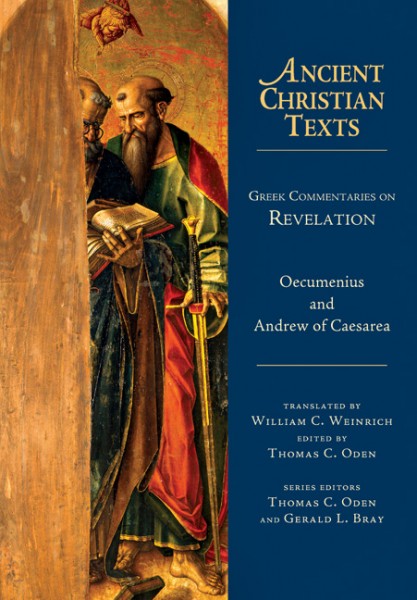
Ancient Christian Texts - Greek Commentaries on Revelation
The Eastern church gives little evidence of particular interest in the book of Revelation. Oecumenius of Isauria's commentary on the book is the earliest full treatment in Greek and dates only from the early sixth century. Along with Oecumenius's commentary, only that of Andrew of Caesarea (dating from the same era and often summarizing Oecumenius before offering a contrary opinion) and that of Arethas of Caesarea four centuries later provide any significant commentary from within the Greek tradition.
William Weinrich renders a particular service to readers interested in ancient commentary on the Apocalypse by translating in one volume the two early sixth-century commentaries. Because of the two interpreters' often differing understandings, readers are exposed not only to early dialogue on the meaning and significance of the book for the faith and life of the church, but also to breadth of interpretation within the unity of the faith the two shared.
Ancient Christian Texts - Homilies on Numbers

Ancient Christian Texts - Homilies on Numbers
Origen of Alexandria (185-254), one of the most prolific authors of antiquity and arguably the most important and influential pre-Nicene Christian theologian, was a man of deep learning and holiness of life. Regrettably, many of his works are no longer extant, in part due to the condemnation of his ideas by the Fifth Ecumenical Council in 553. The condemnation, however, took little account of his historical circumstances and the tentative nature of his speculations. The anathemas were more likely directed toward sixth-century Origenist views than to the views of Origen himself, though clearly he expounded some views that would be judged unacceptable today.
Origen's numerous homilies provide the oldest surviving corpus of Christian sermons and shaped exegesis for succeeding centuries. With Jerome he was one of the early church's great critical and literal exegetes. Devoutly he sought to develop a spiritual exegesis of the Old Testament grounded in the revelation of Jesus Christ. The Homilies on Numbers presented here offer a splendid example of his spiritual interpretation of Old Testament texts. He asks, "What foreshadowing, what warning, what instruction, what encouragement, reproof, correction or exhortation, do we find in the narratives of Numbers for our benefit as Christians?"
Here, based on Baehren's critical Latin text, is the first English edition of these homilies, ably translated with explanatory notes by Thomas P. Scheck.
Ancient Christian Texts - Incomplete Commentary on Matthew (Opus Imperfectum) Volume 1
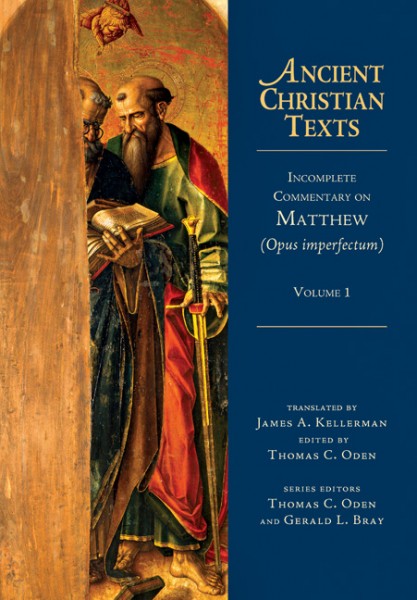
Ancient Christian Texts - Incomplete Commentary on Matthew (Opus Imperfectum) Volume 1
In the translator's introduction to this volume, James Kellerman relates the following story:
As Thomas Aquinas was approaching Paris, a fellow traveler pointed out the lovely buildings gracing that city. Aquinas was impressed, to be sure, but he sighed and stated that he would rather have the complete Incomplete Commentary on Matthew than to be mayor of Paris itself.
Thomas's affection for the work attests its great popularity during the Middle Ages, despite its significant missing parts—everything beyond the end of Matthew 25, with further gaps of Matthew 8:11-10:15 and 13:14-18:35. Despite the gaps what remains is quite lengthy, so much so that we offer the work in two volumes, comprising fifty-four homilies. While the early-fifth-century author displays a few Arian propensities in a handful of passages, for the most part the commentary is moral in nature and therefore orthodox and generic. The unknown author, who for several centuries was thought to be John Chrysostom, follows the allegorizing method of the Alexandrians, but not by overlooking the literal meaning. His passion, above all, is to set forth the meaning of Matthew's Gospel for his readers.
Here for the first time this ancient work is made available in English, ably translated by James A. Kellerman and edited by Thomas C. Oden.
Ancient Christian Texts - Incomplete Commentary on Matthew (Opus Imperfectum) Volume 2

Ancient Christian Texts - Incomplete Commentary on Matthew (Opus Imperfectum) Volume 2
In the translator's introduction to this volume, James Kellerman relates the following story:
As Thomas Aquinas was approaching Paris, a fellow traveler pointed out the lovely buildings gracing that city. Aquinas was impressed, to be sure, but he sighed and stated that he would rather have the complete Incomplete Commentary on Matthew than to be mayor of Paris itself.
Thomas's affection for the work attests its great popularity during the Middle Ages, despite its significant missing parts—everything beyond the end of Matthew 25, with further gaps of Matthew 8:11-10:15 and 13:14-18:35. Despite the gaps what remains is quite lengthy, so much so that we offer the work in two volumes, comprising fifty-four homilies. While the early-fifth-century author displays a few Arian propensities in a handful of passages, for the most part the commentary is moral in nature and therefore orthodox and generic. The unknown author, who for several centuries was thought to be John Chrysostom, follows the allegorizing method of the Alexandrians, but not by overlooking the literal meaning. His passion, above all, is to set forth the meaning of Matthew's Gospel for his readers.
Here for the first time this ancient work is made available in English, ably translated by James A. Kellerman and edited by Thomas C. Oden.
Ancient Christian Texts - Latin Commentaries on Revelation

Ancient Christian Texts - Latin Commentaries on Revelation
Interest in the book of Revelation in the Western tradition is stronger and earlier than that in the East. The earliest full commentary on the Apocalypse is that of Victorinus of Petovium written in the mid to late third century by the earliest exegete to write in Latin. Victorinus interpreted Revelation in millennialist terms, a mode of interpretation already evident in works by Irenaeus, as well as in modest allegorical terms.
Caesarius of Arles wrote in the early sixth century and offered a thoroughgoing allegorical-ecclesial interpretation of the Apocalypse. Apringius of Beja in Portugal, writing in the mid sixth century, drew on Jerome's edition of Victorinus's commentary yet understood the seven seals christologically as the incarnation, birth, passion, death, resurrection, glory and kingdom.
Bede the Venerable, who died in 735, is the last commentator to be included in this collection. Characteristically, he passes on commentary from earlier exegetes, here including that of Augustine, Gregory the Great, Victorinus, Tyconius and Primasius.
William Weinrich renders a particular service to readers interested in ancient commentary on the Apocalypse by drawing together these significant Latin commentaries. The work of translating these texts was begun in preparing the volume on Revelation in the Ancient Christian Commentary on Scripture. We are indebted to William Weinrich for completing this work with his able and fresh translation and notes on these texts.
Ancient Christian Texts: Lectures on the Psalms

Ancient Christian Texts: Lectures on the Psalms
"The Lord shepherds me, and nothing will be lacking for me. In a place of tender grass, there he causes me to encamp."
In his reading of Psalm 23, early Christian theologian Didymus the Blind perceived the comfort that is provided only by Christ, the good shepherd: "The disciples of Christ who have become perfect in his instruction . . . do not simply hear a voice, but they are familiar with the teacher himself."
This Ancient Christian Texts volume presents Didymus's lectures on portions of the Psalms as they were originally presented to his students. Here readers can learn at the feet of this early Christian teacher and find comfort in the Word of God.
Ancient Christian Texts are new English translations of full-length commentaries or sermon series from ancient Christian authors that allow you to study key writings of the early church fathers in a fresh way.
Jonathan Douglas Hicks (PhD, University of Otago) is an independent scholar who previously taught at Trinity School for Theology and Ministry in the Solomon Islands. He is the author of Trinity, Economy, and Scripture: Recovering Didymus the Blind.
Didymus the Blind (ca. 313-398) was born around the year when the Edict of Milan legalized Christianity. He lost his sight due to an illness at a young age but nevertheless excelled at learning and became a defender of Nicene orthodoxy against Arianism. Over the course of his career, he wrote numerous theological treatises and exegetical works. Though some of his theological speculations would later earn the ire of the Second Council of Constantinople, Didymus was also a careful exegete of Scripture.
Apocrypha: Ancient Christian Commentary on Scripture (ACCS)
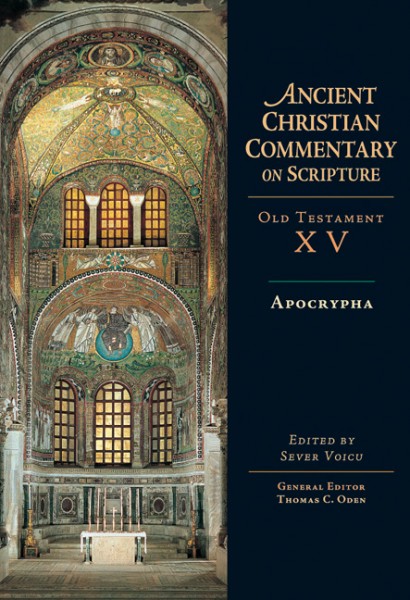
Apocrypha: Ancient Christian Commentary on Scripture (ACCS)
The Ancient Christian Commentary on Scripture does what very few of today's students of the Bible could do for themselves. With the aid of computer technology, the vast array of writings from the church fathers—including much that is available only in the ancient languages—have been combed for their comment on Scripture. From these results, scholars with a deep knowledge of the fathers and a heart for the church have hand-selected material for each volume, shaping, annotating and introducing it to today's readers. Each portion of commentary has been chosen for its salient insight, its rhetorical power and its faithful representation of the consensual exegesis of the early church.
The Ancient Christian Commentary on Scripture is an ecumenical project, promoting a vital link of communication between the varied Christian traditions of today and their common ancient ancestors in the faith. On this shared ground, we listen as leading pastoral theologians of seven centuries gather around the text of Scripture and offer their best theological, spiritual and pastoral insights.
Today the historical-critical method of interpretation has nearly exhausted its claim on the biblical text and on the church. In its wake there is a widespread yearning among Christian individuals and communities for the wholesome, the deep and the enduring. The Ancient Christian Commentary on Scripture does not seek to replace those excellent commentaries that have been produced in the twentieth century. Rather, it supplements them, framing them with interpretive voices that have long sustained the church and only recently have fallen silent. It invites us to listen with appreciative ears and sympathetic minds as our ancient ancestors in the faith describe and interpret the scriptural vistas as they see them.
The Ancient Christian Commentary on Scripture is a postcritical revival of the early commentary tradition known as the glossa ordinaria, a text artfully elaborated with ancient and authoritative reflections and insights. An uncommon companion for theological interpretation, spiritual reading, and wholesome teaching and preaching.
About the Apocrypha volume:
This last volume of the Ancient Christian Commentary on Scripture offers commentary from the early church fathers on the deuterocanonical books of the Bible, with insights that will be of great benefit to preachers and teachers alike. Readers will find some ancient authors translated into English here for the first time. Throughout they will gain insight and encouragement in the life of faith as seen through ancient pastoral eyes.
Chronicles: Bible Speaks Today (BST)

Chronicles: Bible Speaks Today (BST)
Michael Wilcock sees Chronicles as first and foremost a sermon; its object -- to foster a right relationship between God and his people. The Chronicler finds in the records of Israel the "great overall pattern" of God's hand in history. The Lord's constant mercy, love and faithfulness shine through. With great perception, the Chronicler first selects and then proclaims this vibrant pattern, highlighted in the living events of the nations's actual hsitory.
Once its purpose is grasped, the book comes alive. It can be seen as nothing less than a final and momentous look back over the entire Old Testament. Viewed in this way, Chronicles has something of the vividness, contrast and drama of the last book of the New Testament, Revelation.
Michael Wilcock sees the countless persons named and chronicled as part of one people of the living God. They make vivid to us the truths by which the Lord's people in every generation are to live.
About the Bible Speaks Today (BST) Series:
Edited by J.A. Motyer and the late John R. W. Stott, the Bible Speaks Today commentaries are characterized by what Stott called a "threefold ideal . . . to expound the biblical text with accuracy, to relate it to contemporary life and to be readable." As such, each contributor in this series is both a noted scholar and a working pastor.
The BST series, now complete, covers all sixty-six books of the bible (Old and New Testaments) in fifty-five volumes. If you preach or teach from Scripture, the Bible Speaks Today series will help you apply the timeless biblical message to the everyday experiences of your listeners. And if you study the Bible on your own, these volumes will be a helpful resource focusing on the significance of God's Word for your own life and work.
Church's Bible: 1 Corinthians
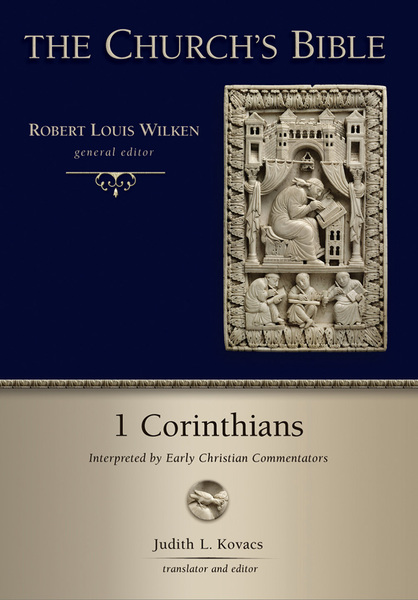
Church's Bible: 1 Corinthians
The church fathers gathered here include Augustine of Hippo, Irenaeus, Gregory of Nyssa, Athanasius, Origen, John Chrysostom, and many more. Preceding the line-by-line exegesis are a lucid essay by Robert Louis Wilken on how the church fathers interpreted the New Testament, an informative introduction to 1 Corinthians by Kovacs, and two chapters of general patristic commentary on Paul and on this letter. Completing the volume are several helpful appendixes and indexes.
Freshly translating many passages into idiomatic English for the first time, Kovacs does not merely excerpt random quotes from the church fathers but instead produces a sustained interaction with their direct comments on 1 Corinthians. This soaking in the wisdom of the past is sure to spiritually refresh and intellectually sharpen contemporary readers who seek to better understand this part of Scripture.
Reviews
"Here is an excellent contribution to this poignantly named series, which should prove a rich resource for libraries, preachers, and expositors." — Theological Book Review"Judith Kovacs has done a magnificent job with this second volume of The Church's Bible. Her translations are always fluent and sometimes inspired, and the extracts she has chosen range from the merely interesting to the arresting. Many of them repay not only study and thought but also prayer and meditation, showing abundantly that commentary on Scripture was, for the church fathers, always at least as much a matter of the heart as of the intellect." — Paul J. Griffiths, University of Illinois at Chicago
"This distinguished work is a model of how to bring patristic exegesis alive for a new generation. Judith Kovacs's selection of passages and her lengthy, fresh translations will yield new theological and exegetical insights to readers not familiar with pre-Enlightenment criticism and should persuade them that this field deserves far more attention than it has until now received. This volume sets a standard for the Church's Bible series that other scholars will want to emulate." — Robert Morgan, University of Oxford
"Kovacs has, here, translated and edited some of the most important early commentary on 1 Corinthians. . . This book is an invaluable tool for any who are interested in the interpretation of scripture throughout the Christian era." — Journal for the Study of the New Testament Booklist
"Deserves to be welcomed warmly, since it allows a wide readership to gain access to ancient biblical interpretations that are either difficult to find or that are so numerous that one easily drowns in the material." — Review of Biblical Literature
Judith L. Kovacs is associate professor of religious studies at the University of Virginia, series editor of the Blackwell Bible Commentaries, and coauthor (with Christopher Rowland) of the Blackwell volume on Revelation.
Church's Bible: Isaiah
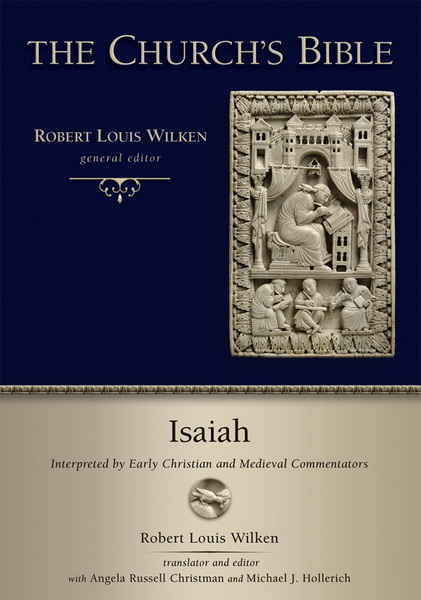
Church's Bible: Isaiah
Wilken's selection of ancient commentators clearly illuminates how Isaiah was used by the New Testament writers and understood by the early church fathers. Each chapter begins with a modern English translation of the septuagint, prepared by Moisés Silva. Editorial comments provide a foundation for understanding the excerpted commentaries and other writings that follow for each chapter.
Isaiah: Interpreted by Early Christian and Medieval Commentators is ideal for devotional and spiritual reading and for a deeper understanding of the church's historical interpretation of this major prophet.
Reviews
"This addition to the Church's Bible series makes available a remarkably rich selection from the great volume of Christian commentary on Isaiah written during the church's first millennium. It is significant both historically, as a contribution to the history of biblical interpretation, and theologically, as an expression of faith nourished by an attentive and devout reading of 'the sacred page.'" — Joseph Blenkinsopp, University of Notre Dame"The Isaiah volume in The Church's Bible is as intellectually and aesthetically delightful as its predecessors in this series, and it is an essential resource for anyone who wants to see what this Hebrew prophet has meant to Christians. Isaiah is especially important among the prophetic books because of the explicitness with which Christians have taken it to speak of Christ, and this is amply represented in the commentaries collected here. So too is some of the anti-Jewish polemic sometimes practiced by Christians. Both threads are important for understanding the history of Christian perceptions of the Jewish people, and they are woven elegantly together in this fascinating book." — Paul J. Griffiths, University of Illinois at Chicago
"This outstanding volume opens a new window on the text of one of Israel's most beloved prophets, Isaiah. I found myself continually entranced by the innumerable insights that the early Christian theological imagination was able to cull from its biblical source. The approach taken by these writers is often as hard-hitting as it is edifying. These classic thinkers took the biblical text seriously and wrestled with problems that continue to befuddle modern readers. This masterful collection of patristic interpretations gives the reader a powerful new lens with which to examine the sacred page. One of the real attractions of the volume is that the selections provided are long enough that one can take a favorite interpreter and follow him through the course of the whole book." — Gary Anderson, University of Notre Dame
"In short, this volume is an outstanding addition to the field of Isaiah studies and can be useful for both scholars and lay readers alike." — Review of Biblical Literature
Robert L. Wilken is the William R. Kenan, Jr., Professor of the History of Christianity at the University of Virginia at Charlottesville. Among his many books is The Land Called Holy: Palestine in Christian History and Thought.
Church's Bible: John
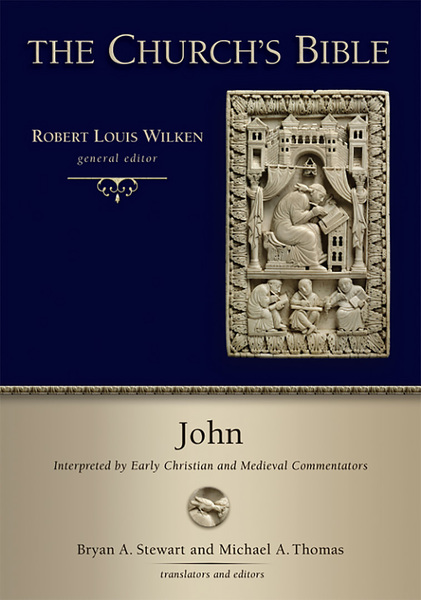
Church's Bible: John
Reviews
“This series rescues from the shadows the many penetrating insights of ancient Jewish and Christian interpreters. . . . They can continue to instruct us today with their perception into the perennial foibles of the human condition.” — Religious Studies Review“Serious students of the Bible will want to consider subscribing to the entire series, which holds the promise of powerfully enriching and recasting scriptural study in the twenty-first century.” — First Things
Bryan A. Stewart is professor of religion at McMurry University, Abilene, Texas, and he also serves as a priest in the Anglican tradition.
Michael A. Thomas is professor of religion and humanities and dean of the College of Arts and Sciences at Concordia University, Portland, Oregon.
Church's Bible: Matthew
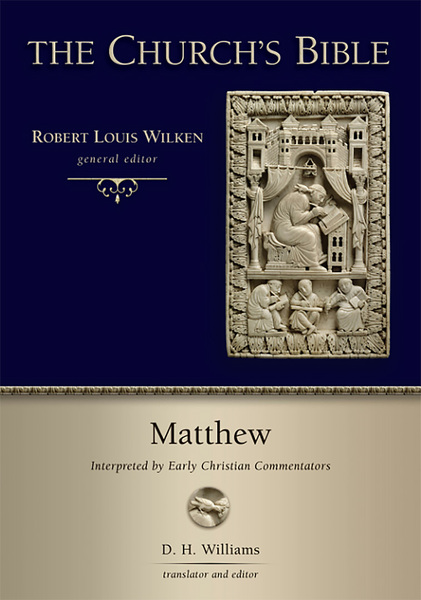
Church's Bible: Matthew
This volume on Matthew contains select freshly translated excerpts from patristic commentators including John Chrysostom, Irenaeus of Lyons, Origen, Tertullian, and Augustine. Ranging chronologically from the second century to the seventh century, these selections splendidly display a neglected part of the church’s interpretive tradition on Matthew.
Reviews
"This series rescues from the shadows the many penetrating insights of ancient Jewish and Christian interpreters. . . . They can continue to instruct us today with their perception into the perennial foibles of the human condition." — Religious Studies Review“Serious students of the Bible will want to consider subscribing to the entire series, which holds the promise of powerfully enriching and recasting scriptural study in the twenty-first century.” — First Things
D. H. Williams is professor of religion in patristics and historical theology at Baylor University and the author of Evangelicals and Tradition: The Formative Influence of the Early Church.
Church's Bible: Romans
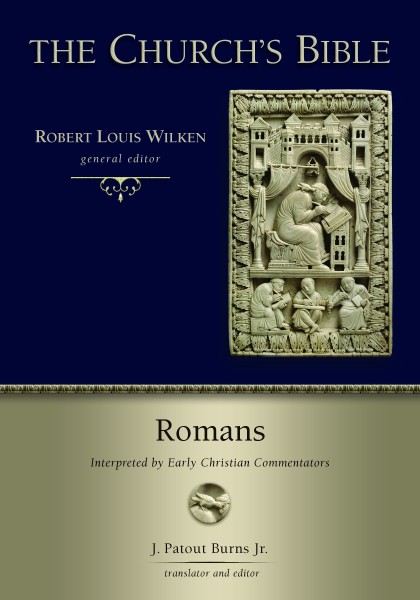
Church's Bible: Romans
This Church's Bible volume brings together select lengthy excerpts from early Christian writings on Romans, Paul's most comprehensive statement of Christian teaching. J. Patout Burns Jr. has judiciously chosen extended passages from such church fathers as Origen, Rufinus, Pelagius, Chrysostom, Ambrosiaster, Augustine, and Theodoret, enabling readers today to benefit from the church's rich treasure trove of commentary on Paul's Letter to the Romans. Covering the first five hundred years of Christian history, this volume incorporates new translations made from the best texts currently available.
Both Burns's pastoral sensitivity and his extensive study of patristics shine through his selection of ancient passages, which run the full gamut of perspectives on Romans. Each passage is relevant and applicable to our current understanding and living of the Christian life, not just historically valuable. This volume -- and the entire Church's Bible series -- will be welcomed by preachers, teachers, students, and general readers alike.
Reviews
"The Church's Bible has already distinguished itself as the preeminent place to find the riches of patristic exegesis made available in a reliable and accessible form. J. Patout Burns's volume, Romans: Interpreted by Early Christian Commentators, is a welcome addition to this series. It provides a wide range of commentary on Romans from such ancient masters as Origen, John Chrysostom, Pelagius, Ambrosiaster, Theodoret of Cyrrhus, Cyril of Alexandria, and, of course, Augustine. Burns's judicious selections reveal the Church Fathers to be careful readers of the biblical text, striving to recover its meaning for their own time and place. This is an invaluable resource for a contemporary reading and recovery of Paul's Letter to the Romans." — David G. Hunter, University of Kentucky"The Church's Bible, a new commentary series on books of the Bible composed of quotations from patristic and medieval commentators, bears witness to the long, rich tradition of biblical interpretation within the church catholic. Such a series has always been badly needed. It also provides a welcome corrective to current fringe modes of interpretation that are more interested in rhetoric, style, or sociology than in the substance and content of the written Word of God. Recommended heartily to all pastors, preachers, and professors and students of theology." — Joseph A. Fitzmyer, S.J., Catholic University of America
"For biblical scholars, reading this volume might be threatening. After all, whether they are conservative, liberal, or agnostic, they have well-established views of what Paul's theological teaching in Romans "is" — and often, if they are Christians, their lives are much invested in these views. But such certitudes are now challenged and relativized. Reading Romans with the ancient commentators opens for us unexpected theological vistas. But to those patient enough to engage in a meditative rereading of Romans side by side with the ancient commentaries so clearly presented by Burns in this volume, I can promise that transformative theological insights will spring forth from Paul's letter." — Review of Biblical Literature
"The care taken with all the volumes in this series is a credit to the learning and the industry of the editors/translations. The monumental project is a valuable resource not only for preachers and scholars but also for anyone who wants to practice lectio divina." — Commonweal
J. Patout Burns Jr. is the Edward A. Malloy Professor Emeritus of Catholic Studies at Vanderbilt Divinity School. His other books include Cyprian the Bishop.
Church's Bible: Song of Songs
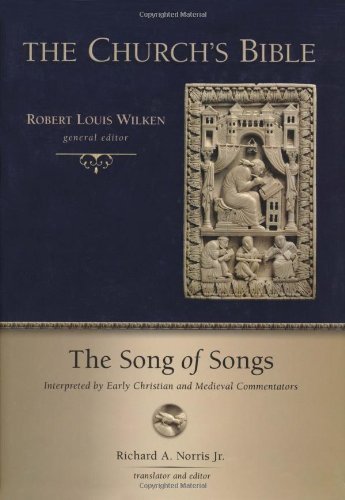
Church's Bible: Song of Songs
In The Song of Songs, the inaugural volume of The Church's Bible, Richard A. Norris Jr. uses commentaries and sermons from the church's first millennium to illustrate the original Christian understanding of Solomon's beautiful poem. In recent times, the Song of Songs has been more a focus of literary than of religious interest, but Norris's work shows that for early Christians, this text was counted, with the Psalms and the Gospels, among those Scriptures that touched most deeply on the believer's relation to God.
All in all, Norris's Song of Songs is a masterful work that aptly acquaints contemporary readers with the church's traditional way of discerning in this text a guide to the character of Christian belief and life. This volume — and the entire Church's Bible series — will be welcomed by preachers, teachers, students, and general readers alike.
Reviews
"The Church's Bible, a new commentary series on books of the Bible composed of quotations from patristic and medieval commentators, bears witness to the long, rich tradition of biblical interpretation within the church catholic. Such a series has always been badly needed. It also provides a welcome corrective to current fringe modes of interpretation that are more interested in rhetoric, style, or sociology than in the substance and content of the written Word of God. Recommended heartily to all pastors, preachers, and professors and students of theology." - Joseph A. Fitzmyer, S.J., Catholic University of AmericaRichard A Norris, Jr. (1930-2005) was Professor Emeritus of Church History at Union Theological Seminary in New York. He was also Priest Associate of the Church of St. Ignatius of Antioch, and Diocesan Canon in the Diocese of New York. His other works include The Christological Controversy.
Colossians and Philemon: Bible Speaks Today (BST)

Colossians and Philemon: Bible Speaks Today (BST)
Fullness and freedom - two aspects of Christian life that we all want to share. Paul wrote about them at length (and depth) in his letter to the Christians at Colossae, where certain new teachers were proclaiming that 'mere Christianity' is not enough. There is, they suggested, a fuller experience, a greater liberation, than they had so far enjoyed. But Paul was adamant: all God's fullness is in Christ alone, and only through his complete work are we set free.
These are the great objective truths of the faith that Dick Lucas highlights in The Message of Colossians and Philemon, enabling us to see both the riches that are ours in Christ and the irrelevance - even blasphemy - of all would-be improvements on what God has done.
About the Bible Speaks Today (BST) Series:
Edited by J.A. Motyer and the late John R. W. Stott, the Bible Speaks Today commentaries are characterized by what Stott called a "threefold ideal . . . to expound the biblical text with accuracy, to relate it to contemporary life and to be readable." As such, each contributor in this series is both a noted scholar and a working pastor.
The BST series, now complete, covers all sixty-six books of the bible (Old and New Testaments) in fifty-five volumes. If you preach or teach from Scripture, the Bible Speaks Today series will help you apply the timeless biblical message to the everyday experiences of your listeners. And if you study the Bible on your own, these volumes will be a helpful resource focusing on the significance of God's Word for your own life and work.
Colossians and Philemon: New International Greek Testament Commentary Series (NIGTC)

Colossians and Philemon: New International Greek Testament Commentary Series (NIGTC)
James D. G. Dunn's exegetical approach is unique and highly informative, and a must-read for scholars seeking divergent well-researched and argued claims on authorship, structure, and theology. Dunn's work goes beyond exegesis and textual analysis; his historical approach describes a dynamic history of the early church during the time of Paul's missions, especially his mission to the church in Colossae. This volume is a notable achievement for the academic community on the study of Colossians.
Awards and Recognition
Academy of Parish Clergy, Special Recognition (1997)
Reviews
Themelios
"The maturity and depth of Dunn's scholarship result in a commentary that is balanced and rich but not overwhelming in detail. The reader would have to look hard to identify someone better suited to comment on Colossians and Philemon and to find scholarship that is so consistently good. What in particular makes this volume worthwhile is the balance it strikes between depth and approachability: the commentary has the weightiness of a reference volume but its writing has a clarity and economy that engages the reader. It is one of the most readable commentaries around."
Colossians, 1-2 Thessalonians, 1-2 Timothy, Titus, Philemon: Ancient Christian Commentary on Scripture (ACCS)
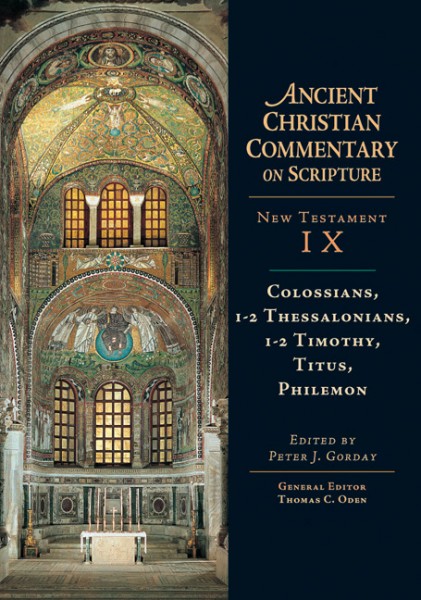
Colossians, 1-2 Thessalonians, 1-2 Timothy, Titus, Philemon: Ancient Christian Commentary on Scripture (ACCS)
The Ancient Christian Commentary on Scripture does what very few of today's students of the Bible could do for themselves. With the aid of computer technology, the vast array of writings from the church fathers—including much that is available only in the ancient languages—have been combed for their comment on Scripture. From these results, scholars with a deep knowledge of the fathers and a heart for the church have hand-selected material for each volume, shaping, annotating and introducing it to today's readers. Each portion of commentary has been chosen for its salient insight, its rhetorical power and its faithful representation of the consensual exegesis of the early church.
The Ancient Christian Commentary on Scripture is an ecumenical project, promoting a vital link of communication between the varied Christian traditions of today and their common ancient ancestors in the faith. On this shared ground, we listen as leading pastoral theologians of seven centuries gather around the text of Scripture and offer their best theological, spiritual and pastoral insights.
Today the historical-critical method of interpretation has nearly exhausted its claim on the biblical text and on the church. In its wake there is a widespread yearning among Christian individuals and communities for the wholesome, the deep and the enduring. The Ancient Christian Commentary on Scripture does not seek to replace those excellent commentaries that have been produced in the twentieth century. Rather, it supplements them, framing them with interpretive voices that have long sustained the church and only recently have fallen silent. It invites us to listen with appreciative ears and sympathetic minds as our ancient ancestors in the faith describe and interpret the scriptural vistas as they see them.
The Ancient Christian Commentary on Scripture is a postcritical revival of the early commentary tradition known as the glossa ordinaria, a text artfully elaborated with ancient and authoritative reflections and insights. An uncommon companion for theological interpretation, spiritual reading, and wholesome teaching and preaching.
About the Colossians, 1-2 Thessalonians, 1-2 Timothy, Titus, Philemon volume:
A 2001 Christianity Today Book of the Year!
While patristic commentary on St. Paul's shorter letters--Colossians, 1-2 Thessalonians, the Pastorals and Philemon--was not so extensive as that on his longer letters, certain passages in these letters proved particularly important in doctrinal disputes and practical church matters. Pivotal in controversies with the Arians and the Gnostics, the most commented-upon christological text amid these letters was Colossians 1:15-20, where Jesus is declared "the image of the invisible God, the firstborn of all creation."
In other texts scattered throughout the Pastorals, the fathers found ample support for the divinity of the Son and the Spirit and for the full union of humanity and divinity in the one redeemer, the "one mediator between God and men, the man Christ Jesus" (1 Timothy 2:5). These early Christian commentators also looked to the Pastorals, where Pauline authorship was assumed, for important ethical and moral teaching, as well as explicit qualifications for choosing church leaders and guidelines for overseeing the work and behavior of widows.
Chief among the Eastern commentators and widely excerpted throughout this volume is John Chrysostom, praised for his pastoral insight and shrewd, generous empathy with the apostle Paul. Other Greek commentators whose works are cited include Theodoret of Cyr, Theodore of Mopsuestia, Severian of Gabala, Ignatius of Antioch, Justin Martyr, Irenaeus, Clement of Alexandria, Athanasius, Basil the Great, Gregory of Nazianzus and Gregory of Nyssa.
Among Western commentators Augustine dominates. His work is joined by that of Ambrosiaster, Pelagius, Jerome, Hippolytus, Tertullian, Novatian, Cyprian of Carthage, Hilary of Poitiers and Ambrose, among others. Of particular interest for their ascetical and devotional insight are works from Syrian and Egyptian churches, including Aphrahat, Ephrem the Syrian, Isaac of Nineveh and Philoxenus of Mabbug.
This volume opens up a treasure house of ancient wisdom that allows these faithful witnesses, some appearing here in English translation for the first time, to speak with eloquence and intellectual acumen to the church today.
Commentaries for Christian Formation: Galatians
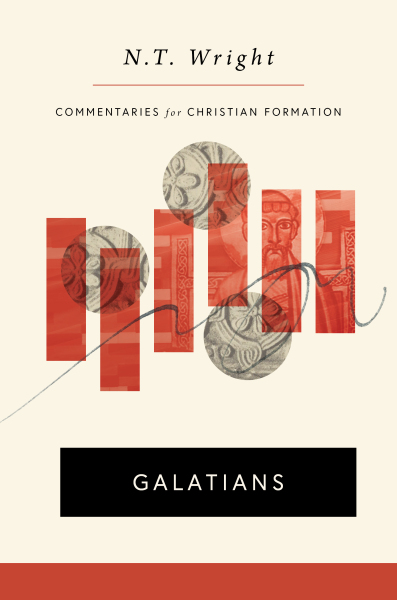
Commentaries for Christian Formation: Galatians
While full of theological import, Paul’s letter to the Galatians also captures and memorializes a significant moment in the early history of Christianity. This commentary from N. T. Wright—the inaugural volume of the CCF series—offers a theological interpretation of Galatians that never loses sight of the political concerns of its historical context. With these two elements of the letter in dialogue with each other, readers can understand both what Paul originally meant and how his writing might be faithfully used to respond to present questions.
Each section of verse-by-verse commentary in this volume is followed by Wright’s reflections on what the text says about Christian formation today, making this an excellent resource for individual readers and those preparing to teach or preach on Galatians. The focus on formation is especially appropriate for this biblical letter, in which Paul wrote to his fellow early Christians, “My children—I seem to be in labor with you all over again, until the Messiah is fully formed in you!”
See How Bible Commentaries Work in the Olive Tree Bible App
N. T. Wright, one of the most highly respected biblical scholars in the world today, is research professor emeritus of New Testament and early Christianity at the University of St. Andrews and senior research fellow at Wycliffe Hall, Oxford. He is the author of over eighty books, including Simply Christian, Surprised by Hope, Paul and the Faithfulness of God, and The New Testament in Its World.
Commentaries for Christian Formation: Hebrews

Commentaries for Christian Formation: Hebrews
How can the Letter to the Hebrews help Christians grow in their faith?
The Letter to the Hebrews tells us that God is trustworthy—that we can trust in Jesus’s defeat of death to lead us to eternal life. Complicating this crucial message, the letter’s enigmatic origins, dense intertextuality, and complex theological import can present challenges to believers wrestling with the text today.
Amy Peeler opens up Hebrews for Christians seeking to understand God in this learned and pastoral volume of Commentaries for Christian Formation. Her fresh translation and detailed commentary offer insights into Christology, the relationship between Judaism and Christianity, and the letter’s canonical resonances. She pays special attention to how the text approaches redemption, providing consolation for the anxious and correction for the presumptuous.
Peeler explains the letter’s original context while remaining focused on its relevance to Christian communities today. Pastors and lay readers alike will learn how Hebrews helps them know, trust, and love God more deeply.
Amy Peeler is professor of New Testament and the Kenneth T. Wessner Chair of Biblical Studies at Wheaton College. She also serves as associate rector at St. Mark's Episcopal Church in Geneva, Illinois. She is the author of Women and the Gender of God, You Are My Son: The Family of God in the Epistle to the Hebrews and the coauthor, with Patrick Gray, of Hebrews: An Introduction and Study Guide.
Commentaries for Christian Formation: Proverbs

Commentaries for Christian Formation: Proverbs
What Proverbs meant to its original audience—and what it means to Christians today
On one hand, Proverbs is perfectly straightforward—a collection of short statements on how to live wisely and well. On the other, the advice of Proverbs, written millennia ago, can seem disconnected from the realities of life today.
John Goldingay’s fresh commentary untangles Proverbs with an eye toward Christian formation. Working from his acclaimed English translation, Goldingay explains each verse in its original context without getting bogged down in technical detail. The commentary centers theological insights beneficial to preaching and pastoral work.
The wisdom of Proverbs can’t be reduced to platitudes. It requires something of the reader: thought, reflection, and openness to the Lord. The Commentaries for Christian Formation Proverbs guides us in the journey of faith seeking understanding.
John Goldingay is David Allan Hubbard Professor Emeritus of Old Testament at Fuller Seminary.






- Adapt your commentary collection month-to-month based on the book or books you are studying.
- Build your commentary library strategically without hundreds of dollars of upfront investment.
- Never get stuck with commentaries you rarely use - swap them out each month as your needs change.



